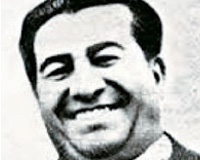Son of Mirza Abdollah, author and editor of marde emruz, Mohammad Masud was born in Qom, 1901. He was one of the boldest journalists of Iran contemporary history. Following his elementary education, he studied Jame-ol-moqaddamat in the religious schools of Qom. He came to Tehran to earn...
Son of Mirza Abdollah, author and editor of marde emruz, Mohammad Masud was born in Qom, 1901. He was one of the boldest journalists of Iran contemporary history. Following his elementary education, he studied Jame-ol-moqaddamat in the religious schools of Qom. He came to Tehran to earn his livelihood and found a job in a printing house. His articles appeared in Qanun, Ayineh Iran, Tehran mossavvar, Sharqi, Shafaqe Sorkh, and Ettelat under the pseudonym m. Dehati. His first masterpiece entitled Night Entertainments was published in Shafaqe Sorkh. He was sent to Paris and Brusselles by the ministry of education to make surveys on the European press and higher education system. He studied journalism in Brusselles. He published articles on socialism which appeared on la gazette. Thus he was summoned to Tehran, and due to his socialistic inclinations, he was dismissed from governmental services.
After Sept. 1941 he founded marde emruz, the first number of which appeared in Aug. 21st 1942. He was engaged in journalism in one of the most critical periods of Iran history. His strong articles against the court found its way among people. During six years, he published only 128 issues. His paper was suspended fifty times.
He founded the "negative resistance" movement and one month later it was renamed as "national resistance organization". Massud's strongly –worded articles against the British and Russian expansionist policies unveiled the dependent character of Tudeh party and its adherents. The papers affiliated to the Tudeh Party, called him reactionary and anachronistic. He published very hot articles against Qavam-os-saltaneh and proposed to pay one million rials of reward to any one who would endeavor to kill him. Subsequently, he was prosecuted for three months, his paper was suspended. However, he published it secretly. Eventually, subsequent to political wheeling and dealing between the leftist and rightist groups, he was murdered in Feb. 13th 1947. His information of the relationship between Razmara and the Tudeh Party and Khosrow Ruzbeh was proved effective in his murder. His murder was not untangled until when Khosrow Ruzbeh was entrapped and confessed his involvement in the plot.
https://iichs.ir/vdcb.5b8urhbzwe4pr.html
iichs.ir/vdcb.5b8urhbzwe4pr.html
